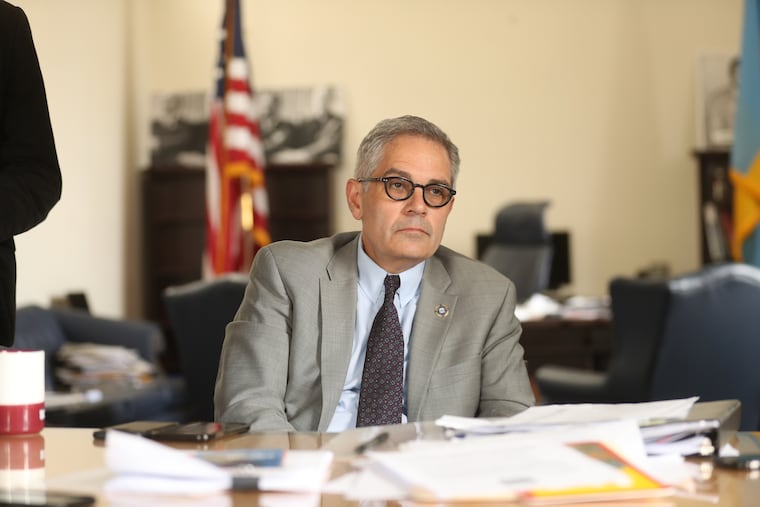Larry Krasner’s $160K-a-year senior adviser was also his creditor
District Attorney Larry Krasner, in his first financial disclosure report as an elected official, said he owed money to a former business partner whom he subsequently hired for a $160,000-a-year advisory position in the prosecutor's office.

District Attorney Larry Krasner, in his first financial disclosure report as an elected official, said he owed money to a former business partner whom he subsequently hired for a $160,000-a-year advisory position in the prosecutor's office.
Krasner listed Michael Giampietro as a personal and business creditor in his statement of financial interests, which he filed in May and which covers his finances for 2017. Krasner's wife, Common Pleas Court Judge Lisa Rau, also listed Giampietro as a creditor in her statement.
The disclosure form did not require Krasner to report how much he owed Giampietro. He did not list him as a creditor in his financial disclosure that covered 2016.
Krasner, a former defense attorney who was elected on a progressive reform platform, declined to be interviewed. He would not reveal the nature or amount of the debt, or when or how it was settled.
Through a spokesman, Krasner said this week that the "business-related financial obligation" to Giampietro "has since been completely satisfied."
"Thanks to being in court nearly every day for 35 years, [Giampietro] has tremendous insight into and relationships with judges, police, prosecutors, sheriffs, defense attorneys, and court administration officials," Krasner spokesperson Ben Waxman said in an email. "He has had a longstanding personal and business relationship with … Krasner and therefore is uniquely qualified to serve as a Senior Advisor in the Philadelphia District Attorney's Office."
Waxman said Giampietro, who started in his position in February, is a "roving supervisor" in the Criminal Justice Center who assists less experienced prosecutors. He also conducts job interviews, manages staffing issues, and handles juvenile resentencings, among other duties, Waxman said.
Giampietro did not respond to requests for comment.
Waxman said Krasner's office "reviewed the city code and found no ethics violations, including the conflict of interest section." He said the review was conducted by Richard Glazer, who is Krasner's ethics officer and the former chairman of the city Board of Ethics. Waxman would not say when the review was conducted, share its findings, or make Glazer available for an interview.
Samuel C. Stretton, a lawyer and legal ethics expert, said he did not believe ethics rules prohibit the city's top prosecutor from hiring a creditor – as long as the loan and job weren't part of a quid pro quo.
"The fact that he owes Michael money, by itself, wouldn't be" a conflict, Stretton said of Krasner and Giampietro.
Stacy Hawkins, an employment attorney and professor at Rutgers Law School, said such an arrangement could interfere with a manager's ability to supervise and evaluate a subordinate's performance.
"It does raise, I would say, some cautionary flags, some yellow flags," Hawkins said, adding: "It may be that you are considering things outside of his job performance in keeping him in employment."
Eric Meyer, an employment partner at the FisherBroyles law firm and president of the Pennsylvania Bar Association's Labor and Employment Law section, said there was nothing inherently wrong with hiring a creditor.
But, Meyer asked, "what happens if that person is not the most qualified candidate? What if that person is not being hired because of a skill set, but because the decision-maker owes money to that person?"
"It's odd," said David Thornburgh, president and CEO of the Committee of Seventy government watchdog group. "I would think, in any setting – public, private, or nonprofit – the boss borrowing money from a subordinate creates the possibility for some odd dynamics in the office."
Krasner's real estate businesses have repeatedly failed to pay taxes over the last decade. In March, the Inquirer and Daily News, WHYY, and City & State PA each reported on separate cases in which the city went to court seeking a total of $177,000 in unpaid taxes from businesses in which Krasner is a partner.
Krasner has criticized the hiring practices of previous district attorneys, saying they were too often "more interested in politics than … in professionalizing things."
"If there is any legacy that this administration leaves, its most important legacy will be the people we bring in," Krasner said in testimony before City Council in April, later displaying a map of the United States and highlighting aspirations to recruit more heavily from California, Texas, Florida, and Illinois.
Giampietro's listed address is in Delaware County, but Waxman said he moved into a Philadelphia apartment this month, in accordance with the residency requirement for city employees.
Krasner also has hired several close campaign advisers as part of his inner circle.
Campaign chair Mike Lee became interim director of legislation, a new position with a salary of $75,000.
Arun Prabhakaran, a longtime friend who said he informally advised Krasner's campaign, left his job as a vice president at the nonprofit Urban Affairs Coalition in Center City to become the district attorney's chief of staff, which pays $160,000 per year.
Movita Johnson-Harrell, a former community organizer who endorsed Krasner's candidacy, was hired as the interim supervisor of victim services with a salary of $96,000.
And Waxman, the campaign spokesperson, was named communications director, with a salary of $90,000.